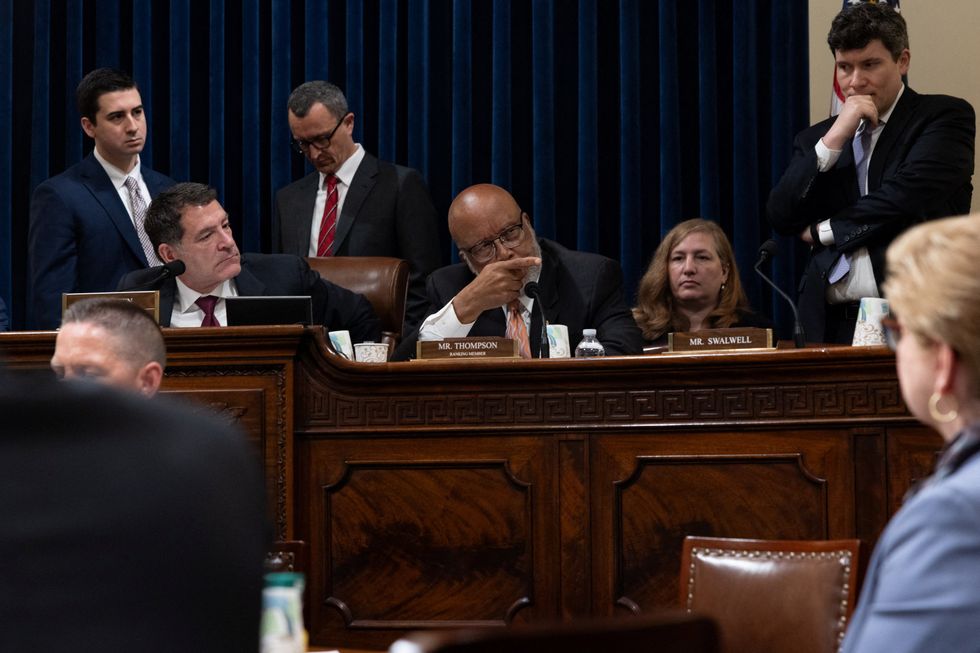Prince Andrew's biographer flags Trump links 'clearly taken out' of Epstein files
WASHINGTON — Donald Trump’s connections with the former Prince Andrew are “very close,” a biographer of the disgraced British royal said, rejecting Trump’s denials and saying evidence of the relationship had been taken out of files relating to investigations of Jeffrey Epstein released by the U.S. Department of Justice.
“The connections with Trump are very close,” Andrew Lownie said. “I mean, clearly this stuff's been taken out of the released papers, but Andrew and Trump had a very close relationship.
“Same interest in golf, making money, in women, there are lots of crossovers between them and lots of ‘locker room discussions’ going on. I mean, when Trump says he doesn't know who Andrew is, there are plenty of pictures of the two of them together. That kind of says everything.”
Lownie, author of Entitled: The Rise and Fall of the House of York, was speaking to the Clinton aide turned Lincoln biographer Sidney Blumenthal and the Princeton historian Sean Wilentz on their podcast, The Court of History.
The Epstein files scandal has lingered since 2019, when the financier and convicted sex offender was found dead in a New York jail cell, where he awaited trial on charges of trafficking underage girls for sex. Officials deemed the case a suicide.
Seven years on, with Trump back in power, the president's once-close links to Epstein remain the subject of intense controversy, reporting and speculation.
In 2019, in the aftermath of Epstein’s death, Trump responded to controversy then engulfing Andrew over his own Epstein ties by saying: “I don’t know Prince Andrew, but it’s a tough story. I don’t know him, no.”
That was swiftly disproved.
Lownie continued: “There are also pictures when Andrew was deputed to take care of him on one of Trump's visits to London. There are various things with golf courses in Scotland, visits in New York. I mean, there's a whole panoply of links between the two of them.”
Trump denies wrongdoing in connection to Epstein, amid a blizzard of allegations arising from mentions in the released files and other reporting. The DOJ has released millions of files relating to Epstein, redacted to varying degrees, but also said it will not make further releases — a stance widely seen as meant to protect the president.
Andrew has not had such powerful protection.
In 2022, he paid a multimillion-dollar settlement to end a sexual assault case brought by Virginia Giuffre, an Epstein accuser with whom the then prince was famously photographed, and who killed herself last year. The settlement made no admission of guilt, and Andrew continues to vehemently deny wrongdoing.
Nonetheless, continuing revelations about Andrew’s friendship with Epstein have cost him his royal titles and roles. The latest Epstein files release, last Friday, contained new pictures of the then prince in compromising positions.
On The Court of History, Lownie switched to a potentially sensitive topic regarding Melania Trump, President Trump’s third wife, describing and defending “the claim that I had in the book, which [Harper] Collins took out after they were threatened with a lawsuit, though it is true, that Melania was introduced to Trump through Epstein.
“That's a claim from Epstein, and it's [in] inverted commas,” Lownie said, noting that the Trump biographer Michael Wolff has also reported the claim.
Melania Trump threatened to sue Wolff for $1 billion over the claim. In response, Wolff filed his own lawsuit, alleging intimidation.
Lownie said: “We can't always believe everything that Epstein said, but this comes from interviews that he did in 2007 for a documentary, and there's no reason for him to have lied to the documentary maker. They built a good relationship.”
Blumenthal noted that in the latest Epstein files release, “Melania had written to Ghislaine [Maxwell, Epstein’s partner, now serving a 20-year sentence for sex trafficking] a letter praising her and calling her ‘sweet pea.’ So clearly [she] is very close to Ghislaine and Epstein and Andrew.”
Delving deeper into the Epstein web, Lownie said: “Yes, I mean, they're all interconnected. I mean, that's one of the fascinating things.
“You know, Peter Mandelson, the former British ambassador in Washington, is very much in the news because of associations with Epstein, taking money from Epstein.”
Scandal over Mandelson’s links to Epstein has engulfed the British government, fueling questions about what Prime Minister Keir Starmer knew when he appointed Mandelson ambassador to Washington last year.
Lownie said: “What we forget is that Mandelson and Andrew were the two witnesses at Lynn Forester and Evelyn de Rothschild’s wedding.
“Lynn Forester was a great friend of Epstein, often on [Epstein’s private plane, known as] the Lolita Express, and she's part of this whole thing.”
Late last year, Forester told the New York Times she “cut ties with [Epstein] in 2000, after he deceived her on a property transaction,” adding: “I was a very small part of Epstein’s life, and he was a blip on mine.”
Lownie continued: “Mandelson was the man who pushed Andrew as the [UK] trade envoy in 2001, so they were both patrons of a children's charity, extraordinarily. So, you know, they're all interconnected.
“Of course, Mandelson has very close connections with various Russian oligarchs as well.
“And in fact, I've seen FBI documents talking about Andrew basically as a Russian intelligence case, he's involved with networks for money laundering and sex trafficking, which connected with Russian intelligence.”
Trump's links to Russia and its president, Vladimir Putin, are also the source of constant media attention.
Blumenthal asked Lownie: “In your book, you mentioned Anna Malova, who was a Miss Russia [and finalist in Miss Universe when Trump owned the pageant] and you mentioned she was a friend of Trump and was also trafficked to Andrew.”
Flight logs show Malova, then 27, Andrew and Maxwell aboard a flight on Epstein's jet in February 1999. There is no suggestion of wrongdoing on the flight.
Lownie said: “Yes, yes. I mean, you know, the connections with Trump are very close.”



 Rep. Bennie Thompson (D-MS) asks a question in a House hearing. REUTERS/Anna Rose Layden
Rep. Bennie Thompson (D-MS) asks a question in a House hearing. REUTERS/Anna Rose Layden  Rep. Ilhan Omar speaking in Las Vegas, Nevada. (Photo credit: Gage Skidmore / Flickr)
Rep. Ilhan Omar speaking in Las Vegas, Nevada. (Photo credit: Gage Skidmore / Flickr)